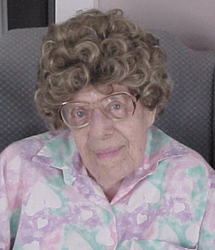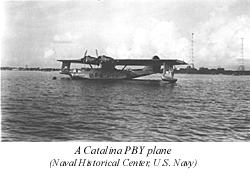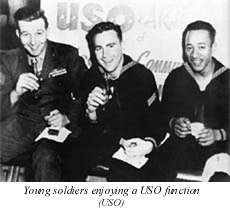|
“The
one thing that hurt us was to send our boys to fight.
We were happy that they could join the Army, but we didn't know where they would end [up].” |
|
 |
 |
|
A
Family Torn Apart
|
|
|
-An
oral history of Cecilia Tybor
|
Home | Table of Contents | Previous Story
Personal Profile | Audio Interview
|
All of Miss Tybor’s brothers served in the Army except for the youngest one, Phillip. “[He] said, ‘I’m going to be different. I’m going into the Navy,’” she recalls. Phillip was sent to the Philippines with the Navy Air Force, but he never returned home. “[He] was assigned to fly on a Catalina PBY. . . . It was a huge flying boat that they mostly used for rescue, and it could land on the water. . . . It could fly fast enough to get away from bullets coming their way.” Cecilia continues, “Phil’s plane with all the men on board . . . [was] shot down, and they never recovered his body. It’s probably lost in the Pacific Ocean.”
Life at home did not change much for Cecilia and her family. She does not recall rationing creating a burden in her home. “We weren’t affected. Not that we were so rich, but we just had the things available.” Miss Tybor further explains, “We had a cow. We had all of the milk we could want . . . [and] churned our own butter. If we needed meat, we had a bunch of chickens in the backyard.” She laughs, “We were poor and didn’t even know it. . . . We didn’t have a car, . . . a radio, a TV, and we didn’t miss it.” In fact the family’s first radio was built for them by a neighbor who was “inclined electronically.”
Miss Tybor still remembers the celebration that took place when the war ended. “They had a big parade [in downtown Houston],” she laughs, “ and my aunt . . . was chosen to be the Statue of Liberty in the parade.” Her family’s joy at the end of World War II was dampened by what they felt when only three of Cecilia’s brothers came home. “It was a bad time to live through,” she reflects, “but you can thank the Lord that things turned out the way they did.” Miss Tybor feels that World War II gave everyone a greater appreciation for America. She says, “I think everybody realized what they had and that we lived in a great country.” |
Home | Table of Contents | Previous Story
 Cecilia
Tybor was thirty-three years old when the U.S. entered World War II. Her close-knit
family was soon torn apart when her four brothers were called into the service.
Cecilia explains that the men had little choice once they were drafted. “I
didn’t hear of anyone refusing to go when they were called. Some of them felt
like it was an honor; they didn’t know what was ahead of them.”
Cecilia
Tybor was thirty-three years old when the U.S. entered World War II. Her close-knit
family was soon torn apart when her four brothers were called into the service.
Cecilia explains that the men had little choice once they were drafted. “I
didn’t hear of anyone refusing to go when they were called. Some of them felt
like it was an honor; they didn’t know what was ahead of them.” Miss
Tybor’s remaining brothers safely returned home, but one nearly met the same
fate as Phillip on the European front. “[He] was stationed in England, and
when they were to cross the Channel, the ship he was on was hit by a submarine,”
she explains. “That ship sank, so a lot of the men lost their lives, but my
brother was one of the fortunate ones who was able to get ashore.” Before
the accident, his division was supposed to relieve another group “on a battleground
where there was fierce fighting, so maybe this happened for the best.” He
and his division were sent to another part of the French coast and avoided
some serious fighting.
Miss
Tybor’s remaining brothers safely returned home, but one nearly met the same
fate as Phillip on the European front. “[He] was stationed in England, and
when they were to cross the Channel, the ship he was on was hit by a submarine,”
she explains. “That ship sank, so a lot of the men lost their lives, but my
brother was one of the fortunate ones who was able to get ashore.” Before
the accident, his division was supposed to relieve another group “on a battleground
where there was fierce fighting, so maybe this happened for the best.” He
and his division were sent to another part of the French coast and avoided
some serious fighting. Throughout
the war Cecilia worked as a bookkeeper during the day and volunteered or went
to USO dances at night. To contribute to the war effort, she purchased war
bonds and worked in a local food pantry, “taking care of people who were unable
to find work at that time.” “That was . . . the least you could do,” she says.
Miss Tybor remembers particularly enjoying the USO dances. She reminisces,
“I went to every one of the dances they had. They were chaperoned, . . . [so]
we could go out on the porch and talk, but you didn’t dare go outside off
of that porch. . . . It was lots of fun.”
Throughout
the war Cecilia worked as a bookkeeper during the day and volunteered or went
to USO dances at night. To contribute to the war effort, she purchased war
bonds and worked in a local food pantry, “taking care of people who were unable
to find work at that time.” “That was . . . the least you could do,” she says.
Miss Tybor remembers particularly enjoying the USO dances. She reminisces,
“I went to every one of the dances they had. They were chaperoned, . . . [so]
we could go out on the porch and talk, but you didn’t dare go outside off
of that porch. . . . It was lots of fun.”